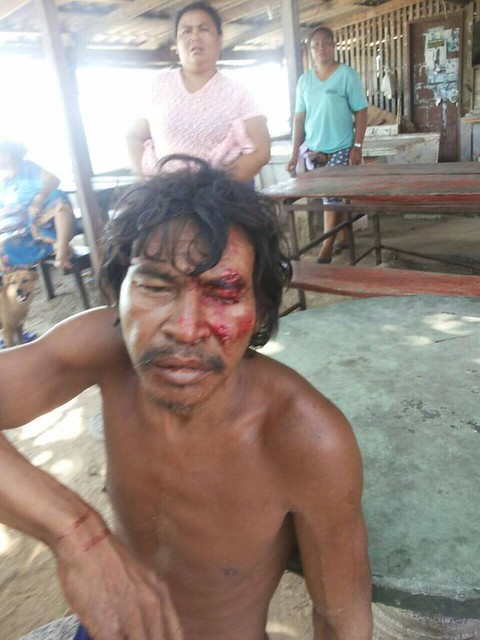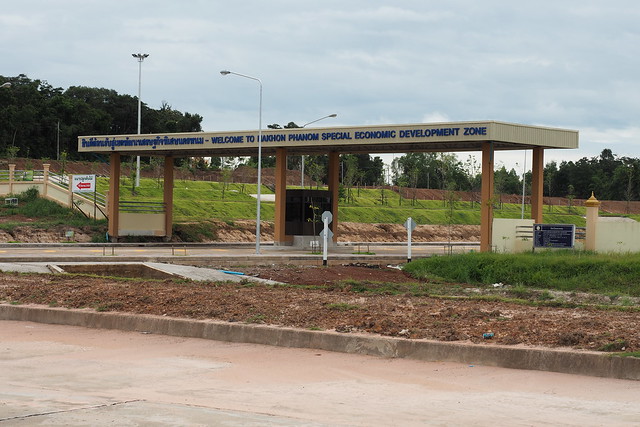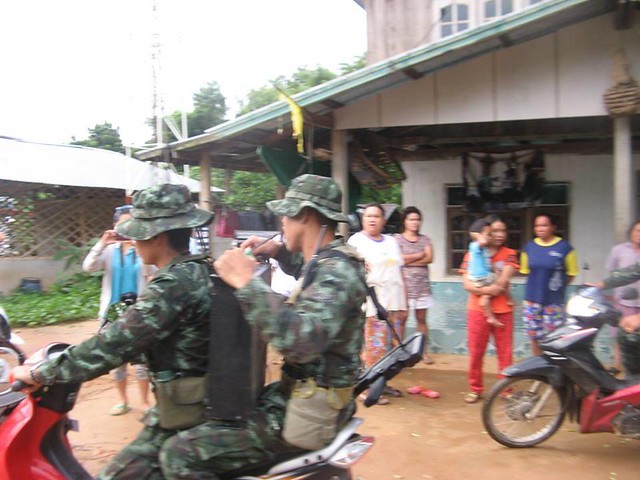After years of fighting for rights over land and resources, communities living on disputed land or standing on the way of state megaprojects are to be left destitute under the new draft constitution written by the junta-appointed Constitutional Drafting Committee (CDC).
In late January, violent skirmishes broke out between Orang Laut people, sea gypsies, and a group of men armed with wooden sticks over a disputed 33 rai on Rawai Beach in Phuket, where Baron World Trade Co has claimed ownership. According to a leaked document circulated on social media, the company contacted the Royal Thai Army to deploy military personnel to guard company workers as they started to construct villas on the disputed land plot. The sea gypsies, however, claimed that their community has been using the land for rituals for at least 100 years and that the company’s land title is illegitimate.
Like a video tape rewound, the violent confrontation between sea gypsies and armed men is hardly new in Thai society, but is only the latest case where communities face private businesses backed up by the muscle of the state. After assuming power in 2014, the Thai junta promised land reform for the country’s landless. But using Section 44 of the Interim Constitution, which gives it absolute power over national security, the regime issued orders to reclaim disputed land nationwide to establish Special Economic Zones and other state megaprojects in the name of development.

An Orang Laut man of Rawai Beach in Phuket injured in skirmishes with a group of unidentified men on 27 January 2016 (photo from Thapanee Letsrichai Facebook page)
Under the new draft constitution referred to as 20/2, the second draft of the country’s 20th constitution, Section 44 will no longer be necessary for removing obstacles hindering state projects because this draft will undermine community rights over land and resources, leaving them at the mercy of state authorities.
Language about community rights appears in Article 53 of Chapter 5 of the draft charter, the chapter on directive principles of fundamental state policies. The Article reads “the state must conserve, protect, recover, manage, and use or exploit natural resources, the environment, biodiversity sustainably for the greatest benefit. People and local communities must participate in the procedure and benefit from it in accordance with the law.”
On a first glance, the article might sound promising. But according to Decharat Sukkumnoed, a lecturer at the Economics Faculty of Kasetsart University, who is an expert on rural development and agricultural economics, the wording of the article leaves many loopholes at the expense of communities.
“People and communities only have rights to participate and benefit from the procedure [of state projects], but they do not have right to suggest or reject projects,” Decharat wrote on Four Laws for the Poor, a website promoting land reforms. He pointed out that Article 67 of the 2007 Constitution offers better protection on community rights because it states that people who are to be affected by state projects must be heard before the projects are initiated.
Like Decharat, the Northern Development Foundation (NDF), a civil society group promoting community rights, recently issued a statement against the 20/2 draft constitution. Part of the NDF statement reads “the NDF demands that community rights must be written into the draft constitution and concludes that the draft constitution of Meechai Ruchuphan [CDC President] gives more power to the state in order to benefit investors. [It] overlooks community rights and lacks people’s participation. Therefore, the NDF will not accept the Meechai draft.”

The gate of the planned Special Economic Zone of Nakhon Phanom next to the custom center at the base of the Third Thai-Laos Friendship Bridge, where as many as 400 families are to be evicted in the name of the SEZ project (file Photo).
Jirawit Chimmanukul, a human rights activist who has been assisting people facing eviction orders in an area in Nakhon Phanom which the authorities have earmarked for construction of a Special Economic Zone, said that the concept behind community rights in the draft constitution differs from that of the 2007 Constitution.
“Under the draft constitution, community rights become matters of the state, but not of the people,” the activist told Prachatai. “Under the 1997 and 2007 Constitutions, people could sue the state over state projects, but as community rights under the draft constitution are no longer considered part of the chapter on rights and liberties, it remains uncertain whether this will be possible, as the organic laws have not been drafted.”
As an alumnus of the Faculty of Law of Khon Kaen University, Jirawit said “to me the whole draft looks clumsy and has a lot of loopholes as if its drafters do not have a law background. But anyhow, the draft has nothing which could be related to the people.”
Adding to this, Decharat pointed out in his essay that even in the 1997 Constitution, the right of communities to sue the state was promised but never written into the subsequent organic laws until the Constitution was torn up by the 2006 coup-makers and replaced with the 2007 Constitution. Therefore, there is no guarantee that the state could be held responsible when community rights are trespassed.
The economics lecturer further said that the draft constitution will also make it possible for the state to go ahead with its projects without having to conduct Environmental Impact Assessments (EIA) or Environmental Health Impact Assessments (EHIA).
In summary, Article 54 under Chapter 5 of the draft constitution merely stipulates that the state shall listen to people in communities who are to be affected by state projects and allow them participation in such projects in accordance to the law.
This article differs greatly from Article 67 of the 2007 Constitution which made it compulsory that before state projects were to be allowed, both EIA and EHIA must be carried out together with recommendations from relevant public agencies, said Decharat.
On the question of EIA and EHIA, Ranong Kongsaan, one of the key leaders of Khon Rak Baan Koed (KRBK) (People Who Love Their Home), an organisation of people from six villages affected by the gold mining operations of Tungkum Company in Wang Sapung District of the northeastern province of Loei, said that the EIA and EHIA currently conducted prior to development projects by the state are already controversial.
“The ways in which EIA and EHIA are carried out by the state are usually substandard because people who are to be truly affected by state projects are not given opportunities to participate and they are not viewed are equal partners in the eyes of the state authorities,” said Ranong. “Now, it will be worse as neither are even compulsory any longer. We won’t accept this draft constitution.”


